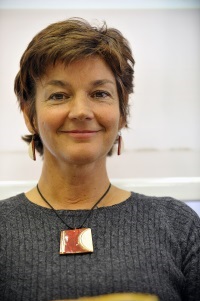Simona Sorrentino interviews Patrizia Cordin
Patrizia Cordin, associate professor in the Department of Humanties at the University of Trento coordinates the interdepartmental research group on linguistic minorities and is part of the European project AThEME on multilingualism in Europe.
Professor Cordin, can you describe the key areas that your research deals with?
 This interdepartmental project, supported by the University and by the Province of Trento, was started around ten years ago to encourage recognition of linguistic minorities and to promote their languages and culture in areas such as the province of Trento, which has three historical linguistic minorities (Ladin, Mòcheno and Cimbrian) and many linguistic minorities among recent immigrants. Since 2014 linguistic research on minority languages has become part of the European project AThEME (Advancing the European Multilingual Experience), which deals with aspects of multilingualism that have received little attention up to now, such as the relationship between national and regional languages (minority languages, dialects) and between national languages and the languages of recent immigrants.
This interdepartmental project, supported by the University and by the Province of Trento, was started around ten years ago to encourage recognition of linguistic minorities and to promote their languages and culture in areas such as the province of Trento, which has three historical linguistic minorities (Ladin, Mòcheno and Cimbrian) and many linguistic minorities among recent immigrants. Since 2014 linguistic research on minority languages has become part of the European project AThEME (Advancing the European Multilingual Experience), which deals with aspects of multilingualism that have received little attention up to now, such as the relationship between national and regional languages (minority languages, dialects) and between national languages and the languages of recent immigrants.
What interdisciplinary skills come together in research on multilingualism?
Multilingualism is closely linked to a variety of factors: economic, social, psychological, and obviously linguistic. In the group at the University of Trento there are researchers with skills in theoretical linguistics, Romance linguistics, Germanic linguistics, sociolinguistics, language acquisition and psycholinguistics. Another fundamental aspect of interdepartmental research is working with colleagues from Law who deal with comparative constitutional law regarding groups and minorities.
There are 17 universities from 8 countries participating in the AThEME project, which is financed by the European Commission as part of the 7th Framework Programme. What is the impact at a European level?
The results of AThEME are particularly relevant for educators, speech-language pathologists, and politicians. To inform people working in these contexts, AThEME will produce, by the end of 2018, summaries of the results achieved in different areas, along with recommendations for language policy. There will be suggestions on how to promote regional and heritage languages (the languages of recent immigrants). Another significant element will be the proposal of diagnostic criteria for the recognition of language disorders at preschool age, in order to distinguish them from possible delayed speech production in bilingual children.
As part of AThEME, the University of Trento is one of the Italian branches of the information service “Bilingualism Matters”, coordinated by the University of Edinburgh. Who is this service for and what does it do?
Bilingualism Matters aims to be a bridge between research and the community, helping to raise awareness of multilingualism. So it is aimed at parents, at those working in schools (particularly preschool and primary schools) and those who make language policy decisions. The researchers working on the project are available for meetings and seminars on topics such as bilingualism and minority languages, the cognitive advantages of bilingual education in early childhood, and the relationship between bilingualism and language disorders. In recent years various meetings have been held on these topics with families, preschool teachers, and speech therapists, and we have started working with the Cimbrian, Mòcheno and Ladin cultural institutes.
The learning of two foreign languages, in addition to one’s mother tongue, is a European priority that has also been taken up at the local level. What is the vision that underlies this objective?
There are various reasons, some well-known, others less so: knowing more than one language allows one to communicate with more people; those who speak several languages can be part of several communities and have a wider variety of social and cultural experiences; language skills are increasingly valued in the labour market; those who are bilingual have cognitive advantages as they can pass more easily from one task to another and can employ selective attention towards the pertinent elements in a given task (fewer distractions); and finally, regular use of more than one language seems to be excellent exercise for the brain even in old age. To reach these objectives though, we know that school alone is not enough, and that we need to collaborate with the whole of the community involved.
What are the impacts on society and the contributions that research into multilingualism can provide at a political and social level?
Recognising the advantages of multlingualism means supporting it within families and in schools. It can be supported by giving a primary role to education in one’s mother tongue, which is the basis for learning other languages, and by encouraging early bilingual acquisition through exposure that is quantitatively rich and qualitatively varied, with input from different speakers and in different registers. It is very important to give teachers up to date information regarding the linguistic development of the bilingual child and on techniques for teaching a language as L1 and as L2 in multilingual classes, just as it is important to communicate with the parents of students who do not know the language of the country they are living in. Promoting minority languages is a great opportunity for everyone, linguistically, cognitively, and culturally.




